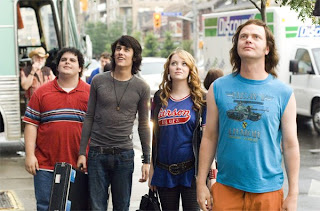Story Matters
 |
| An old & classic story |
Story does matter. It always has. The more that I watch AMC (American Movie Classics)-- and for some reason (nostalgia perhaps) I watch a lot of AMC during the holiday season--the more that I'm reminded--Story Matters (the network's tagline is Story Matters Here). Of course, they're referring to the cinematic version, but the essence of storytelling, whether spoken or written, holds true. How does story distinguish itself from all those other elements of storytelling, such as description, narrative, grammar, characterization. Isn’t it all those things rolled into one? I don’t think so.
Story is the underlying journey that words and images travel to unveil an adventure, an emotion, a history, a tale. As a writer, I like to visualize my story sorted out before I press those first lettered keys. Of course, story will change and fluctuate, morph and undulate as you go along. But, whether you’re a writer or a filmmaker, the reason you initially decided to focus your time and imagination into the context of a book or movie is because you had a story to tell. If you’re a reader or a viewer, you’re looking for a story whose images will stay with you after the final credits roll.
Story is more important than the writing of it. Story has mattered since before humans could write. The first stories were oral tales told around the fires of nomadic trekkers. Gilgamesh, Odysseus, Beowulf, and The Arabian Nights emphasize the importance of the story because you may not be able to quote a line, but you probably can summon an image from one of these tales. Storytelling was a way to record the collective conscience of a culture; to share a history; to imprint a taboo. But they all had to be entertaining or nobody would listen.
Story matters is why The DaVinci Code by Dan Brown was so successful (in my opinion). The poor guy was plagued and pilloried for his poor writing style, sloppy structuring, etc. But he had a great story. Going back much further, most people can explain one of the many Bible stories on cue. The writing is spotty, suffers in translation, and shows little flair. But the images of a garden of paradise, a great flood, flying beasts, conquest over giants, and miracles galore will stay with us long after other, better articulated prose has faded for want of a story.
Of course, action verbs and minimally invasive adverbs are important, but they’re not going to help you tell your story if your story is lame. With so many commercial fiction books on the market today, the story matters theory is also the reason why some stories excel while others fall flat. In our ceaseless quest to be clear and proper, we sometimes forget the thundering bloodstream that must run through a novel, show, or movie. You can’t just have believable characters, vividly imagined scenes, and visual and aural cues aplenty (don’t forget to mention the smell or taste of something at least twice in a scene).
The important thing is to remember the tale: Who is Eve? Why is she doing that? What does Adam think about Eve? Why do I care? What can they hope to accomplish in this literary dance of destiny? Okay, that’s a bit much. Suffice it to say: if it’s a good story, you’ll be desperate to know what happens next. Why? Answer that, and you’ve got your story.
In the romance genre, it’s especially important to be aware of the story. Sweaty clinches and throbbing clutches are a dime a dozen. What happens between clinch and clutch is what holds our attention. In the 1942 film Casablanca, all the elements of storytelling come together beautifully. Great lines (“We’ll always have Paris”) and great acting…but what we remember best is the story: A cynical and embittered American expatriate crosses paths with the woman who broke his heart and now needs his help. Simple. Elegant. Captivating.
Know what your story is before you tell it. And if it’s well told, all the better.
What is it about a story that matters to you?
Best Wishes,


Story DOES matter and I love reading yours. I hope you'll publish more soon!
ReplyDeleteAbsolutely! Style is ephemeral but story sticks with you long after the author's name slips out of our consciousness.
ReplyDeleteThanks, Lisa! Finishing up a new novel right now. I'll keep you posted.
ReplyDeleteYou're right, Buck. It really is all about the story. I think any author will tell you that as they write their story, it sort of takes on a life of its own and becomes its own entity. Hopefully, it lasts long after we're gone.
The best part of a story for me is what the protagonist learns from the events. In my favorite stories, the character has grown wiser, deeper, and/or higher, although I admit to occasional fascination when the story plays against expectations (like the ending of the movie the Graduate, or the ending of the memoir "Angela's Ashes" by Frank McCourt, when the characters look at the screen and say "now what?" This anti-ending puts the burden on the reader to imagine their own ending.
ReplyDeleteJerry
Memory Writers Network